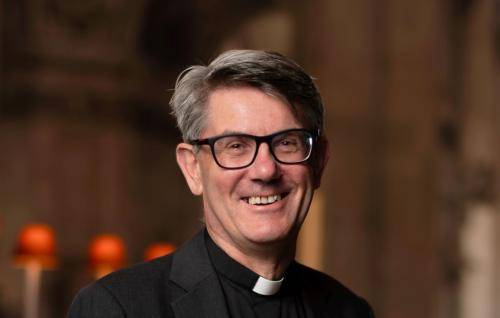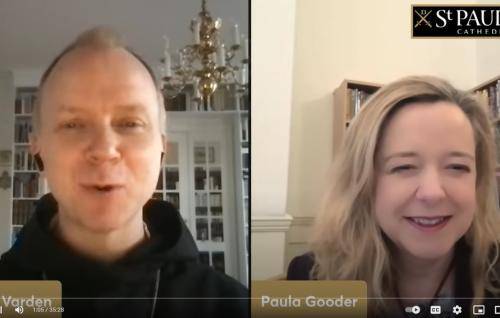A Commoner's Messiah
A Commoner's Messiah
David Benjamin Blower reflects on the Messiah as we move through Holy Week into Easter.
1. Who do we follow?
I grew up hearing about a character called Christ. Christ was the subject of wonderful tales. Christ was a law of the universe woven into theological formulas and turns of phrase. I didn't always know what people meant when they said things about Christ, but I knew that it was important to look like I knew.
I was an odd child in that I read the Bible for pleasure. I couldn't help noticing a difference between the Christ I often heard about and the Messiah character I read about. Messiahs are rather earthy folks, often associated with messy political events.
You may be wondering why I’m making such a thing about the two words – after all Christ is the Greek translation of the Hebrew word Messiah. For me, though, the point is that they convey something strikingly different. While Christ was otherworldly and serene, the Messiah in my Bible was homeless, Jewish, argumentative, merry, colonised and criminalised. While Christ was the singular figurehead of the Christian religion, Messiahs are always coming and going: this particular one would not have known what a Christian was. While Christ assured me of peace after death, the Messiah was rashly involved in the world of the living, with talk of casting down rulers, ending war and law, subverting money, and making the world a joyous and peaceful place.
We are close to the Easter story of crucifixion and resurrection: a tale of supernatural things. Things beyond my experience. As some tell it, the death of Christ was a sort of regrettable tragedy, mysteriously orchestrated by God to save individual souls. But there’s nothing mysterious about Messiahs facing execution. Messiahs were usually outlaw figures on a knife edge, confronting violent political powers. The Romans had killed plenty of them.
A serene and distant Christ calls people to follow him into some inward space of serenity. I try to go there every day. But when the Commoner’s Messiah calls me to follow him, to what am I called? To homelessness and poverty and marginal life? To drinking and feasting and partying? To giving time and attention to people who are commonly ignored? To welcoming the enemy? To the social position of slavery? To taking sides and speaking truth to power?
The Commoner’s Messiah is not quite like that distant serene figure. He is dangerously present. No one who lives out the world as it could be, ever comes out unscathed. I am curious about this business. I want to spend Easter with this Messiah, and to allow his rather earthly practices to shine a light on my own place in this world, stretched as it is between the powerful and the powerless.
2. On confrontation
I grew up in the South, so I'm not trying to score cheap points when I say that Jesus was a Northerner. Most of the doings we read about in Matthew, Mark and Luke happen in the North, in the small towns and rural areas. These stories of healings and feasts and inspired discourses happen in the politically marginal places, mostly among marginal people. But as the story develops the Commoner’s Messiah keeps giving hints that at some point they will be going South. Everybody knows there is another kind of energy down South; down in the Capitol where the power lies. At one point Thomas speaks aside to the worried followers, “let us go with him to Jerusalem to die with him.” It sounds like the stuff of doomed political revolutions.
It has always been popular to say that Jesus was not political. By saying this wildly untruthful thing we have always been able to solve two problems. The first problem is that, if he was political, most would say he was unsuccessful. The world carried on, same as ever. The second problem is that, while his followers were awaiting an immediate return to settle the score, the return has been a long time coming. It became popular to talk as though this Messiah had no interest in confronting the world or changing it. The political Messiah became the serene and distant Christ.
Let’s tarry a while though, with this Commoner’s Messiah figure. Let’s stay with the trouble and allow the story to remain open and incomplete.
When the Messiah finally arrives in Jerusalem it's quite a scene. It had been a long time coming. He famously rides in on a donkey with a singing crowd as though they were welcoming some new pauper king. The Jerusalem elites are quite rightly on edge. They’re trying to keep the Romans sweet, and nothing sets the colonisers off like the sound of indigenous self-determination. The indigenous american ghost-dance was declared illegal by European colonisers for exactly the same reason. “Tell your followers to be quiet!” they say to the Commoner’s Messiah.
When the procession comes to a stop, Jesus gets off his donkey and wanders around the temple. He looks around at everything and says… precisely nothing. The story is on a knife edge. You can hear the crowd breathe. The time has come for a confrontation. There will be a week of turning over tables and public challenges to the powers that be.
There is a time for everything. It’s not always the time to confront the powers. But if, for me, the time to confront them never arrives, it is quite likely that I am unknowingly among those who need confronting.








